If you’re feeling overwhelmed by current events, you’re not alone.
By taking time to read and research, we can find the ability to ground ourselves, reflect, and prepare to meet the present moment. This process is not only critical for understanding our world better, but also for building empathy and even developing critical thinking and practical skills.
The collection below aims to recommend readings that are informative and empowering, that contextualize some of the many issues that our world is facing today, and that enable readers to build their understanding and capacity for addressing the issues of the day. It combines fiction, non-fiction, and poetry, but it is, of course, not exhaustive — readers can find even more texts and resources representing a broad range of perspectives in CSUN’s collection by searching in OneSearch.
Peace & Justice Movements of the Past
“With a new introduction by Anthony Arnove, this edition of the classic national bestseller chronicles American history from the bottom up, throwing out the official narrative taught in schools–with its emphasis on great men in high places– to focus on the street, the home, and the workplace. Known for its lively, clear prose as well as its scholarly research, A People’s History of the United States is the only volume to tell America’s story from the point of view of–and in the words of–America’s women, factory workers, African-Americans, Native Americans, the working poor, and immigrant laborers. As historian Howard Zinn shows, many of our country’s greatest battles–the fights for a fair wage, an eight-hour workday, child-labor laws, health and safety standards, universal suffrage, women’s rights, racial equality–were carried out at the grassroots level, against bloody resistance. Covering Christopher Columbus’s arrival through President Clinton’s first term, A People’s History of the United States, which was nominated for the American Book Award in 1981, features insightful analysis of the most important events in our history.”– Provided by publisher
“Americans have been at war for most of our history as a people. Wars of conquest gave way to wars of empire, the Civil War to the World Wars, and the Cold War to the War on Terror. Our national anthem celebrates heroism under fire, and martial imagery permeates our politics and our pastimes. But at every turn in this history, Americans have questioned and resisted both particular wars and justifications for war in general. Taking up the pen instead of the sword, they have produced a body of literature of great passion and power, a homegrown American tradition that refuses the proposition that war is the inevitable price of liberty or prosperity–that dares to envision a world where people learn war no more. Gathering essays, letters, speeches, memoirs, songs, poems, cartoons, leaflets, stories, and other works by nearly 150 writers from the colonial era to the present, War No More brings this extraordinary writing together for the first time in a single volume”–Dust jacket.
“A visually stunning graphic non-fiction book on queer and trans resistance. Over the past ten years, we have witnessed the rise of queer and trans communities that have defied and challenged those who have historically opposed them. Through bold, symbolic imagery and surrealist, overlapping landscapes, queer illustrator and curator Syan Rose shines a light on the faces and voices of these diverse, amorphous, messy, real, and imagined queer and trans communities. In their own words, queer and trans organizers, artists, healers, comrades, and leaders speak honestly and authentically about their own experiences with power, love, pain, and magic to create a textured and nuanced portrait of queer and trans realities in America. The many themes include Black femme mental health, Pacific Islander authorship, fat queer performance art, disability and health care practice, sex worker activism, and much more. Accompanying the narratives are Rose’s startling and sinuous images that brings these leaders’ words to visual life. Our Work Is Everywhere is a graphic non-fiction book that underscores the brilliance and passion of queer and trans resistance. Includes a foreword by Lambda Literary Award-winning author and activist Leah Lakshmi Piepzna-Samarasinha, author of Care Work : Dreaming Disability Justice.”– Provided by publisher.
Building Community & Honing Skills for the Future
“Around the world, people are faced with crisis after crisis, from the COVID-19 pandemic and climate change-induced fires, floods, and storms to the ongoing horrors of mass incarceration, brutal immigration enforcement, endemic gender violence, and severe wealth inequality. As governments fail to respond to—or actively engineer—each crisis, ordinary people are finding bold and innovative ways to share resources and support vulnerable members of their communities. This survival work, when done alongside social movement demands for transformative change, is called mutual aid. This book is about mutual aid: why it is so important, what it looks like, and how to do it. It provides a grassroots theory of mutual aid, describes how mutual aid has been a part of all larger, powerful social movements, and offers concrete tools for organizing, such as how to work in groups, decision-making process, how to prevent and address conflict, and how to deal with burnout.Mutual aid isn’t charity: it’s a form of organizing where people get to create new systems of care and generosity so we can survive.” — Publisher’s description
“First published in Portuguese in 1968, Pedagogy of the Oppressed was translated and published in English in 1970. The methodology of the late Paulo Freire has helped to empower countless impoverished and illiterate people throughout the world. Freire’s work has taken on special urgency in the United States and Western Europe, where the creation of a permanent underclass among the underprivileged and minorities in cities and urban centers is increasingly accepted as the norm. With a substantive new introduction on Freire’s life and the remarkable impact of this book by writer and Freire confidant and authority Donaldo Macedo, this anniversary edition of Pedagogy of the Oppressed will inspire a new generation of educators, students, and general readers for years to come.”– Provided by publisher.
“Viral Justice is born out of the twin plagues of COVID-19 and police violence-a double crisis that has since created a portal for humanity to rethink all that we’ve taken for granted about the social order and life on this planet. We have healthcare policies neglecting the needy, education policies breeding ignorance, labor policies producing disposable people, housing policies building scarcity, environmental policies ensuring our extinction-all by design. In this book, Ruha Benjamin argues passionately that we can and must design otherwise. Viral Justice offers a micro-theory of change that requires readers to individually confront how we participate in unjust systems, even when “in theory” we stand for justice.Benjamin shines light on the patterns of inequality we perpetuate by simply doing our jobs, clocking in and out, making small talk with our neighbors, avoiding uncomfortable conversations, all while the machinery of everyday life hums along. Benjamin does not ignore the macro changes that need to happen. Instead, she questions the distinction between the macro and the micro and looks at how individuals and groups are disrupting the status quo. She draws on examples of mutual aid and collective healing to elaborate a practical and principled approach to spreading solidarity and justice. The book covers a wide range of social arenas, from policing and incarceration to healthcare and scientific research to work and education. In each chapter, Benjamin explores the conditions in the various settings and then sheds light on the justice work that is being done. Along the way, she seamlessly pulls in relevant history and recent social science research”– Provided by publisher.
“There is a growing interest in fungi and mycelium as a material, the ever-branching connecting threads of the fungal world. The entanglements and how this rhizomatic network functions is not just a fascinating ecological system and material, but carries a profound usefulness as a metaphor for our potential new systems, ways of thinking and behaviors. Let’s Become Fungal! takes its inspiration from the world of art and mycology and shares innovative practices from Latin America and the Caribbean that are rooted in multispecies collaboration, symbiosis, alliances, non-monetary resource exchange, decentralization, bottom-up methods and mutual dependency all in line with the behavior of the mycelium. Every chapter is phrased as a question. They do not lead to answers, but to twelve teachings addressing for instance collaboration, decoloniality, non-linearity, toxicity, mobilization, biomimicry, death, and being non-binary. Simultaneously it ventures deeper into the world of fungi. The teachings from the fungus may inspire artists, collectives, organizations, educators, policy-makers, designers, scientists, anthropologists, change-makers, curators, urbanists, activists, gardeners, community-leaders, farmers, and many others, to become more fungal in their ways of working and being”– Provided by publisher.
Empathy- and Resilience-building Fiction & Poetry
“In 2025, with the world descending into madness and anarchy, one woman begins a fateful journey toward a better future. Lauren Olamina and her family live in one of the only safe neighborhoods remaining on the outskirts of Los Angeles. Behind the walls of their defended enclave, Lauren’s father, a preacher, and a handful of other citizens try to salvage what remains of a culture that has been destroyed by drugs, disease, war, and chronic water shortages. While her father tries to lead people on the righteous path, Lauren struggles with hyperempathy, a condition that makes her extraordinarily sensitive to the pain of others. When fire destroys their compound, Lauren’s family is killed and she is forced out into a world that is fraught with danger. With a handful of other refugees, Lauren must make her way north to safety, along the way conceiving a revolutionary idea that may mean salvation for all mankind.” Source: Nebula Awards
A novel that explores the lives of those who shed their ethnic identity in pursuit of the American dream highlights a different character in each chapter, including Hector, a middle-aged day laborer who witnesses a murder, and his ex-wife Felicia, who survives a drive-by shooting. –From Publisher
“Postcolonial Love Poem is an anthem of desire against erasure. Natalie Diaz’s brilliant second collection demands that every body carried in its pages–bodies of language, land, rivers, suffering brothers, enemies, and lovers–be touched and held as beloveds. Through these poems, the wounds inflicted by America onto an indigenous people are allowed to bloom pleasure and tenderness: “Let me call my anxiety, desire, then. / Let me call it, a garden.” In this new lyrical landscape, the bodies of indigenous, Latinx, black, and brown women are simultaneously the body politic and the body ecstatic. In claiming this autonomy of desire, language is pushed to its dark edges, the astonishing dunefields and forests where pleasure and love are both grief and joy, violence and sensuality. Diaz defies the conditions from which she writes, a nation whose creation predicated the diminishment and ultimate erasure of bodies like hers and the people she loves: “I am doing my best to not become a museum / of myself. I am doing my best to breathe in and out. // I am begging: Let me be lonely but not invisible.” Postcolonial Love Poem unravels notions of American goodness and creates something more powerful than hope–a future is built, future being a matrix of the choices we make now, and in these poems, Diaz chooses love”–Provided by publisher.
This volume contains a thorough revision of the author’s early poems, 1950-1979, along with nine previously unpublished poems from that period, and an essay describing the revision process. Readers new to Lorde’s work will meet here a major American poet whose concerns are international, and whose words have left their mark on many lives. Readers of “The Black Unicorn”, “Sister Outsider”, “The Cancer Journals”, “A Burst of Light”, and “Our Dead Behind Us”, and the thousands who have attended her poetry readings and speeches, will recognize in this book the roots and the growing-points of a transformative writer. Never has a poet left so clear and conscious a track of artistic choices made in the trajectory of a life. Far from rewriting old poems to fit a changes historical moment, she has finely rehoned formal elements to illuminate the original poems. Throughout, Lorde’s lifelong themes of love and anger, family politics, sexuality, and the body of the city can be seen gathering in power and clarity.
Understanding Immigration Issues
For resources on immigrant rights and advocacy, check out the work of organization like CHIRLA and RAICES.
“The United States is known as a nation of immigrants. But it is also a nation of xenophobia. In [this book], acclaimed historian Erika Lee shows that an irrational fear, hatred, and hostility toward immigrants has been a defining feature of our nation from the colonial era to the Trump era. Americans have been wary of almost every group of foreigners that has come to the United States. Benjamin Franklin ridiculed German immigrants for their ‘strange and foreign ways.’ Americans’ anxiety over Irish Catholics turned xenophobia into a national political movement in the 1850s. Over the century that followed, Chinese immigrants were excluded, Japanese incarcerated, and Mexicans deported. Today, Americans fear Muslims, Central Americans, and the so-called browning of America. Xenophobia has not been an exception to America’s immigration tradition, an episodic aberration on an inevitable march toward inclusion. It is, in fact, Lee argues, an American tradition in its own right, deeply embedded in our society, economy, and politics. Forcing us to confront this history, [this book] explains how xenophobia works, why it has endured, and how it threatens us all. It is a necessary corrective and spur to action for any concerned citizen”–Publisher’s description.
“In the United States, the crisis of undocumented immigrants draws strong opinions from both sides of the debate. For those who immigrate, concerns over safety, incorporation, and fair treatment arise upon arrival. For others, the perceived economic, political, and cultural impact of newcomers can feel threatening. In this informative three-volume set, top immigration scholars explain perspectives from every angle, examining facts and seeking solutions to counter the controversies often brought on by the current state of undocumented immigrant affairs. Immigration expert and set editor Lois Lorentzen leads a stellar team of contributors, laying out history, theories, and legislation in the first book; human rights, sexuality, and health in the second; and economics, politics, and morality in the final volume. From family separation, to human trafficking, to notions of citizenship, this provocative study captures the human costs associated with this type of immigration in the United States, questions policies intended to protect the “American way of life,” and offers strategies for easing tensions between immigrants and natural-born citizens in everyday life. Features: Discusses topics rarely covered, including sexual migration, religion, values, and mental health; Features essays across disciplines in the fields of psychology, law, politics, social work, public policy, history, education, and health; Includes tables, maps, photos, and a bibliography for each volume to provide visual interest and additional learning opportunities; Probes the latest controversies centered on recent immigration legislation in Arizona, Georgia, and Alabama; and Familiarizes readers with history, theories, and legislation related to undocumented migration in the United States”–Publisher’s website
“Abuses in detention centers. Detention of handicapped children. The silencing of activists. Each week, another attack on immigrant rights comes to light.It’s going to be hard to say we didn’t know. ICE has escalated a campaign that tears apart families and ruins lives. But this didn’t begin, and won’t end, with Donald Trump in the White House. The Obama administration deported record numbers of immigrants, wildly expanded the scope and capacities of ICE, and supported detention center quotas. Voting Democrat alone won’t save these children.Immigration does not take place in a vacuum; each time the United States pushes through another exploitative trade deal or wreaks havoc on sovereign countries, we perpetuate migration flows fueled not by opportunity but by desperation. How long will we continue funding an agency premised upon the abuse and dehumanization of undocumented immigrants? We need to abolish ICE. This concise, accessible book sets out the reasons why and the way it can be brought about.”-from publisher via Amazon.com
Politics & Power in the U.S. (and beyond)
“Often hailed as the “first freedom,” free speech is the bedrock of democracy, the enemy of tyranny, and the gateway to enlightenment. Research reveals a strong correlation between freedom of speech and democracy, innovation, and advancements in human rights, as well as reductions in conflict, corruption, and discrimination. But for all its benefits, free speech remains a challenging, controversial, and often counterintuitive principle, easily subject to erosion in times of social and political upheaval. And today, in democracies and authoritarian states around the world, freedom of speech is now on the retreat. In Free Speech, Jacob Mchangama traces the long, contested history of a powerful idea, beginning with its origins in the intellectual ferment of classical Athens, where it enabled the development of the world’s first democracy. Through captivating stories of defenders of free speech throughout history, from the eighth century ‘Abbāsid caliph Abū Ja’far al-Manṣūr to the anti-lynching crusader Ida B. Wells, Mchangama reveals how the free exchange of knowledge and ideas underlies all scientific and literary achievement, and how it has enabled the advancement of civil rights across the globe. Indeed, he argues, freedom of speech has far more often served the cause of the oppressed than the cause of the oppressors. Yet the temptation to restrict speech, too, is a historical constant, and Mchangama explores how elite entrenchment and anxiety about new technologies can lead even the most dedicated defenders of liberty down this dangerous path. Meticulously researched and deeply humane, Free Speech demonstrates just how much humanity has gained from this essential principle – and just how much we stand to lose if we allow it to erode”– Provided by publisher.
For a more expansive list of resources on systems of racism, incarceration, and more, check out this Resource Guide on the Black Lives Matter Movement and Anti-Racism
Combating Disinformation
“Disinformation made possible by rapid advances in cheap, digital technology, and promoted by organized networks, thrives in the toxic political environment that exists within the United States and around the world. In Lies that Kill, two noted experts take readers inside the world of disinformation campaigns to show concerned citizens how to recognize disinformation, understand it, and protect themselves and others. Using case studies of elections, climate change, public health, race, war, and governance, Elaine Kamarck and Darrell West demonstrate in plain language how our political, social, and economic environment makes disinformation believable to large numbers of people. Karmarck and West argue that we are not doomed to live in an apocalyptic, post-truth world but instead can take actions that are consistent with long-held free speech values. Citizen education can go a long way towards making us more discerning consumers of online materials and we can reduce disinformation risks through digital literacy programs, regulation, legislation, and negotiation with other countries.” — Description provided by publisher.
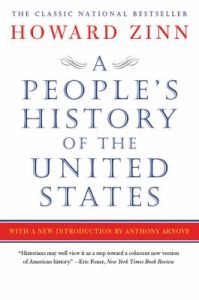 A People’s History of the United States by Howard Zinn
A People’s History of the United States by Howard Zinn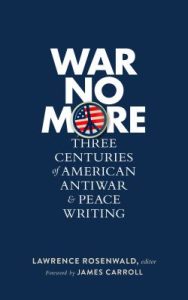 War no more : three centuries of American antiwar and peace writing
War no more : three centuries of American antiwar and peace writing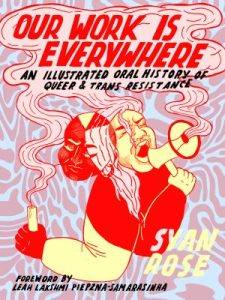 Our work is everywhere : an illustrated oral history of queer & trans resistance by Syan Rose
Our work is everywhere : an illustrated oral history of queer & trans resistance by Syan Rose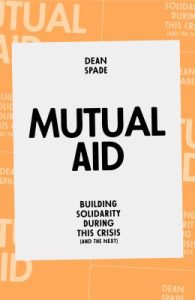 Mutual aid: building solidarity during this crisis (and the next) by Dean Spade
Mutual aid: building solidarity during this crisis (and the next) by Dean Spade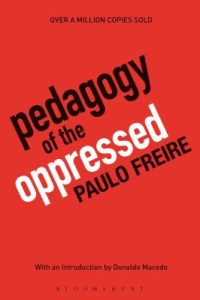 Pedagogy of the oppressed by Paulo Freire
Pedagogy of the oppressed by Paulo Freire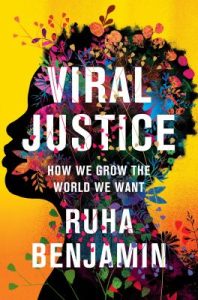 Viral justice : how we grow the world we want by Ruha Benjamin
Viral justice : how we grow the world we want by Ruha Benjamin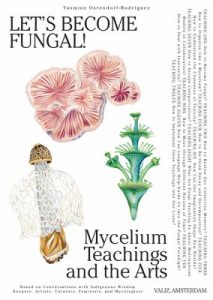 Let’s become fungal! : mycelium teachings and the arts : based on conversations with indigenous wisdom keepers, artists, curators, feminists, and mycologists by Yasmine Ostendorf-Rodríguez
Let’s become fungal! : mycelium teachings and the arts : based on conversations with indigenous wisdom keepers, artists, curators, feminists, and mycologists by Yasmine Ostendorf-Rodríguez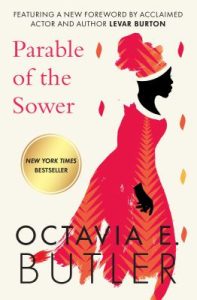 Parable of the sower by Octavia E. Butler
Parable of the sower by Octavia E. Butler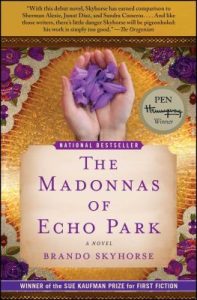 The madonnas of Echo Park : a novel by Brando Skyhorse
The madonnas of Echo Park : a novel by Brando Skyhorse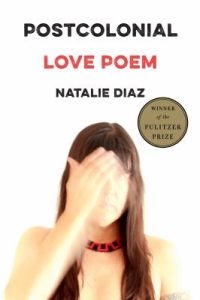 Postcolonial love poem by Natalie Diaz
Postcolonial love poem by Natalie Diaz


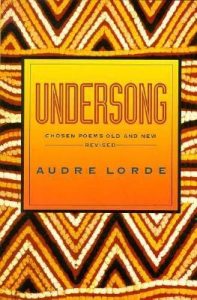
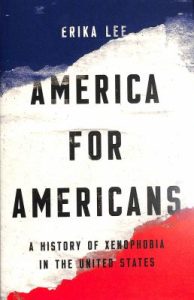 America for Americans : a history of xenophobia in the United States
America for Americans : a history of xenophobia in the United States 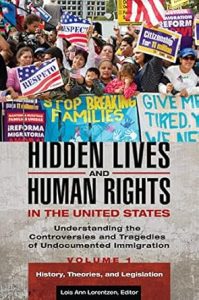 Hidden lives and human rights in the United States : understanding the controversies and tragedies of undocumented immigration
Hidden lives and human rights in the United States : understanding the controversies and tragedies of undocumented immigration 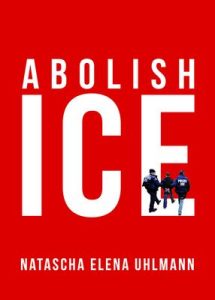 Abolish ICE (2019) by
Abolish ICE (2019) by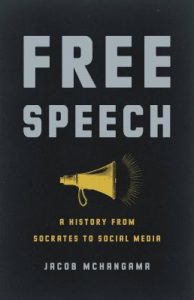 Free speech : a history from Socrates to social media
Free speech : a history from Socrates to social media 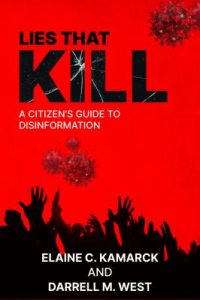 Lies that kill : a citizen’s guide to disinformation
Lies that kill : a citizen’s guide to disinformation 